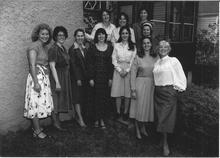Miriam Gideon
Prolific composer Miriam Gideon took inspiration for her compositions from great poetry and Jewish prayers. After earning degrees from Boston University and Columbia, she taught courses at Brooklyn College and City College before joining the faculty of the Jewish Theological Seminary’s new cantorial school in 1955. In 1970, she earned a doctorate of sacred music from the Jewish Theological Seminary, and she was inducted into the American Academy and Institute of Arts and Letters in 1976. From 1967 to 1991, she taught at the Manhattan School of Music. Gideon’s compositions range from vocal solos to chamber operas and include several pieces with Judaic inspiration. Some of her compositions based on Jewish liturgy include Sacred Service, Shirat Miriam L’Shabbat, and Eishet Hayil.
Education and Teaching Career
Miriam Gideon had a notable career as a musical educator and as a prolific composer whose works have been widely performed and published.
She was born in Greeley, Colorado, on October 23, 1906. She displayed early musical talents, which were encouraged with piano studies. She continued her studies in Boston, with Hans Barth, and with her uncle Henry Gideon, a composer and conductor. After settling in New York City, she continued studies with Lazare Saminsky and Roger Sessions. She also earned a BA degree from Boston University, an MA from Columbia University and, in 1970, a Doctor of Sacred Music degree from the Jewish Theological Seminary of America (JTSA). She joined the faculties of Brooklyn College and CUNY, the Manhattan School of Music, and then in 1955 the newly formed Cantors Institute of JTSA.
In 1949, Gideon married writer-educator Frederic Ewen, a colleague at Brooklyn College. He died in 1989.
Honors and Musical Compositions
Gideon’s roster of over fifty compositions includes selections for full and chamber orchestras, instrumental solos and ensembles, piano music, vocal solos, choral works, cantatas, and a chamber opera. Among Gideon’s honors are the Ernest Bloch Choral Prize and awards from the American Society of Composers, Authors and Publishers (ASCAP), the National Federation of Music Clubs, and the American Academy of Arts and Letters. She received commissions from the New York Camerata, the Da Capo Chamber Players, the Elizabeth Sprague Coolidge Foundation in the Library of Congress, and Park Avenue Synagogue in New York City, as well as a composer’s grant from the National Endowment for the Arts. A strong interest in literature guided her settings of poetry by Robert Burns, Cyril Connolly, Heinrich Heine, Robert Herrick, Friedrich Hölderlin, James Joyce, John Keats, Amy Lowell, Archibald MacLeish, Edna St. Vincent Millay, Christina Rossetti and William Shakespeare.
Gideon’s compositions include several of particular Judaic inspiration: Sacred Service, for soloists, mixed choir, flute, oboe, trumpet, bassoon, viola, cello, and organ; a Sabbath evening service entitled Shirat Miriam L’ SabbathShabbat [The Song of Miriam for the Sabbath], for cantor-tenor, mixed choir, flute, oboe, trumpet, bassoon, viola, cello, and organ; Spiritual Madrigals, for male voices, with viola, cello, and bassoon; a song cycle based upon biblical texts from Psalms and Proverbs called Eishet Hayil [A woman of valor], for soprano and piano; Adon Olam [Lord of all], an anthem for chorus, oboe, trumpet, and strings; a cantata based upon the Book of Proverbs, entitled The Habitable Earth, for solos, chorus, oboe, and piano or organ; Psalm 84, How Goodly Are Thy Tents, for women’s voices, with piano or organ; and a wordless spiritual, Biblical Masks, for violin and piano or solo organ. Her compositions are profoundly introspective and skillful. Crafted in the genre of what she preferred to describe as “free atonality,” they are highly concentrated and of strong impact. She said of her Shirat Miriam L’Shabbat, “It is as much an expression of the meaning of Sabbath as it is of what I feel to be my place among the Jewish people.”
Miriam Gideon died in New York City on June 18, 1996.
WWIAJ (1938).



